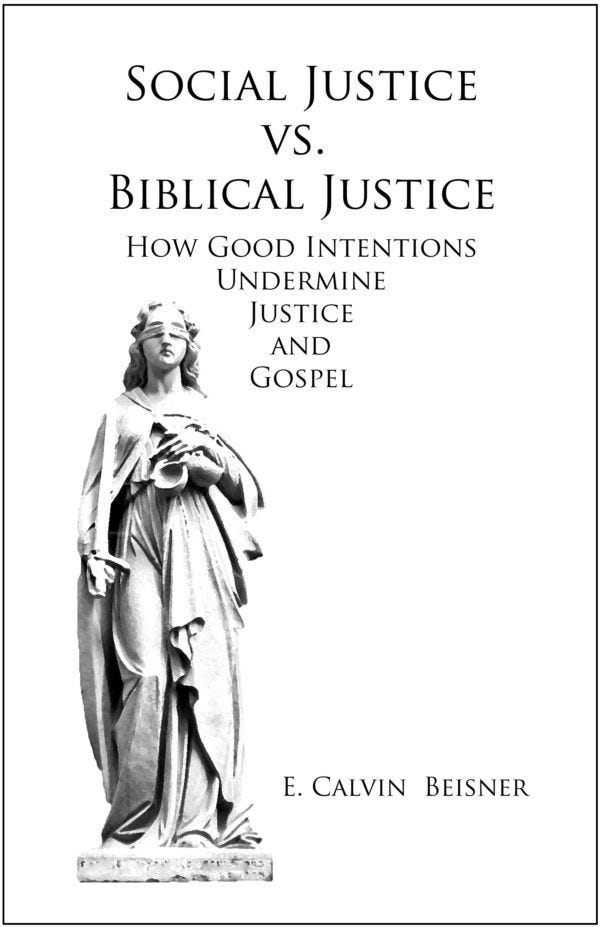Social Justice Vs. Biblical Justice: How Good Intentions Undermine Justice and Gospel
Book Review
Social Justice Vs. Biblical Justice: How Good Intentions Undermine Justice and Gospel
E. Calvin Beisner (Good Trees Press, 2018), 44 pp.
There are many reasons why the contemporary push to integrate critical race theory (hereafter CRT) into Christian ethical reasoning is not only problematic but contrary to the Christian faith. For instance, we have dealt with the philosophical worldview underlying CRT in several places, drawing attention to its anti-Christian metaphysics, epistemology, and anthropology.1 Such critiques may help reveal how the structure of reasoning leading to “social justice” activism is completely at odds with Christian doctrine, but what about the concept of “justice” itself? Are evangelical social justice advocates advancing a Biblical doctrine of justice, or are they attempting to redefine the concept of justice to suit their own ideological ends?
In his booklet Social Justice Vs. Biblical Justice: How Good Intentions Undermine Justice and Gospel, E. Calvin Beisner offers a solidly biblical critique of social justice as a concept, in addition to its proponents’ eisegetical arguments. As Beisner explains, his goal in the booklet is to first “evaluate some common claims that Biblical justice requires equality of outcome – or some approximation of it...[and] then look carefully at what the Bible really does say about the nature and value of justice.”2 Thus, he begins by evaluating five common eisegetical arguments made by evangelicals in support of a Christianized “redistribution of wealth and equalization.” The arguments are based upon five different portions of Scripture, namely –
1. Jesus and the Rich Man3
2. The Sabbatical Year Law4
3. The Jubilee Year Law5
4. Sharing of Goods in the Jerusalem Church6
5. The Pauline Collections: “That There Might Be Equality”7
Beisner gives the context of the passages employed by social justice advocates, explains their meaning, and goes on to show how they do not support the redistribution of wealth and equalization.
The next chapter delves into Scriptures’ definition of justice, explaining the four criteria of justice, the relationship of justice to rights, the difference between positive and negative rights, the five types of justice found in Scripture, and the incompatibility of “social justice” and the Bible’s definition of justice. This chapter seamlessly segues into the next, which answers the question – “Why Does the Bible Speak So Much of Doing Justice for the Poor?” Beisner answers with Scripture, writing that although Scripture condemns partiality it commands us to care for the poor
Because the poor are particularly vulnerable to injustice in ways others aren’t. The poor, therefore, are more frequently victims of injustice than are others. Furthermore, the many Hebrew words translated as “poor” in these contexts often emphasize not material destitution but vulnerability to oppression. In other words, it is not simply because they are poor that Scripture tells us to help the poor by administering justice…we focus on justice for the poor because they are so often the victims of injustice.8
Social justice proponents misunderstand the Scriptural commands to show kindness and generosity toward the victims of injustice. These commands, moreover, are misunderstood by social justice proponents to be governmental, when in actuality “the Bible never...put[s] responsibility for charity into the hands of the civil government.”9 God has given the task of showing charity toward the victims of injustice to individuals, whereas he has given the state the task of enforcing justice.
Most importantly, Beisner notes that the social justice proponents confuse justice and grace. “Where the needy suffer because they have been unjustly treated,” writes Beisner, “they need justice.”10 Yet “if such justice is not attainable,” he continues, “they need charity.”11 Scripture clearly teaches us that “granting unearned benefits is grace, not justice.”12 This is important to remember, for “if care for the needy is made a matter of justice to the needy rather than to God, then grace becomes law.”13 The confusion of law and grace inexorably leads a confusion of Law and Gospel, showing us that the contemporary push for the acceptance of social justice concepts as compatible with Christianity is not at all harmless. Rather, by confusing law and grace/justice and charity evangelical social justice proponents risk denying the very Gospel they so adamantly claim to believe.
Beisner’s booklet is an excellent tool for Christians who are seeking to better understand what the Scriptures teach about justice and the church’s responsibility to the needy. It will aid Christians in their fight against professedly Christian social justicians seeking to impose their unbiblical beliefs on the church, and non-Christian proponents of social justice who twist the Scriptures. Beisner’s case is presented carefully, concisely, and for a wide reading audience. We pray that the Lord will use it for the glorification of his Gospel, and for the betterment of his bride.
—h.
For more on this, see my article “Is Critical Race Theory Anti-Christian? Yes.”, Thorn Crown Ministries, Dec 13, 2018, https://thorncrownministries.com/blog/2018/12/13/is-critical-race-theory-anti-christian-yes.
Beisner, Social Justice, 8.
ibid., 9-10.
ibid., 10-11.
ibid., 11-13.
ibid., 13-14.
ibid., 14-16.
ibid., 30.
ibid., 31.
ibid., 32.
ibid.
ibid., 31.
ibid., 33.





